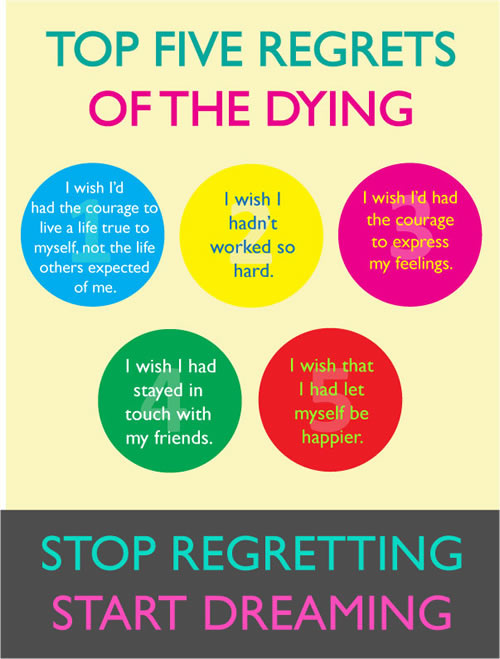Lesson 11: Regrets and Lessons for the Living and Dying
Attention

Learning Outcomes
Upon completion of this lesson's material, students will be able
- Demonstrate developed fundamental skills to understand and communicate about death with others, including with terminally ill and bereaved people.
- Explain and describe choices that can be made related to your own deaths – identify ways to make informed decisions about end-of-life events such as obituaries, eulogies, and funerals.
- Become more motivated to live now, take risks, and accomplish life's goals.
This course has been an examination of research, theories, case studies and philosophical and academic commentary on sociocultural dimensions of death & dying across time and societies. Topics have included funerals, hospice practices, trauma, afterlife beliefs, grief, bereavement and memorial, death in popular culture, end-of-life issues, cemeteries and body disposition, euthanasia, art, film, music, literature, and genocide & war.
Teaching
Watch: Saying the Four Things that Matter Most for Living and Dying Well by renowned US palliative care physician and author Dr Ira Byock, as he talks about the four things that matter most for living and dying well at National Palliative Care Week 2013 in Melbourne, Australia.
Watch: Don't Mean to Dwell on This Dying Thing a tedx presentation by Rebecca Brown that challenges American discomfort with death by sharing experiences from her work with hospitalized adolescents and young adults who are suffering or dying. She suggests that our "pornographic" relationship with death creates fear, anxiety, and loneliness for those who are dying, and that for the living, the illusion that death is avertible, unnatural, and obscene. Brown is the founder and director of Streetlight, a support program that partners premedical and healthcare students with young people who are living with a chronic illness or fear of an early death.
Review the information on this website: Death and Dying: an “unparalleled Buddhist insight into death and dying, helping us to develop an awareness of our own mortality in a way that will totally enrich and transform our life.”
If you have not already, watch Kelli Swazey’s ted.com talk: Life that doesn’t end with death to begin to understand “that relationships with loved ones don’t simply end when breathing does.”
You may have noticed that typing subjects into youtube may give you a wide variety of resources, information and interesting presentations that are available for you as students and for individuals with whom you may be working. Don’t hesitate to explore these resources, as you live, work and play.
Watch Kathryn Schulz: Don’t regret regret to try to envision the purpose of meaning making, embracing regrets and learning from our failures, as well as our successes.
Assessment

Lesson 11 Journal Entry
Summarize your experience in this class. Highlight the readings and resources, and provide feedback for what worked and what did not. Discuss any changes to your understanding or any alteration that you may make to your personal and/or professional experiences with death/dying. What were three things that worked well in this course? What are three improvements that you would make? What mattered? What would you like to have known more about?
Lesson 11 Discussion
Looking at Erikson’s proposition of ‘life in review’- usually within integrity v. despair- apply this task to any aged individual that may be experiencing loss, and provide supportive evidence regarding how a person can complete a life in review successfully, in order to find meaning, purpose, generativity and to embrace their experience of living and/or dying. Here is a site that asks life in review questions in order to get you to think about what someone may ask themselves regarding living successfully. Use the bio-psycho-social-spiritual model, Bronfenbrenner’s Ecological Systems Theory, integrate learning from other classes or trainings, other lessons and other resources. How can someone make meaning, even out of seemingly meaningless or painful experiences?
Lesson 11 Assignment
Submit a 1,000 word essay explaining and describing choices that can be made related to your own death – identify ways to make informed decisions about end-of-life events such as obituaries, eulogies, and funerals. Indicate whether you have an advanced directive, and how an advanced directive can be obtained. Identify how you’d create a will. Discuss any power of attorney or guardian wishes, in general terms. Discuss your obituary wishes, funerary wishes, who will eulogize you (if anyone) and why? What would you like the funeral (if you’d like one) to be like? Why? Music? What? What message do you want people who mourn you to understand? Why?